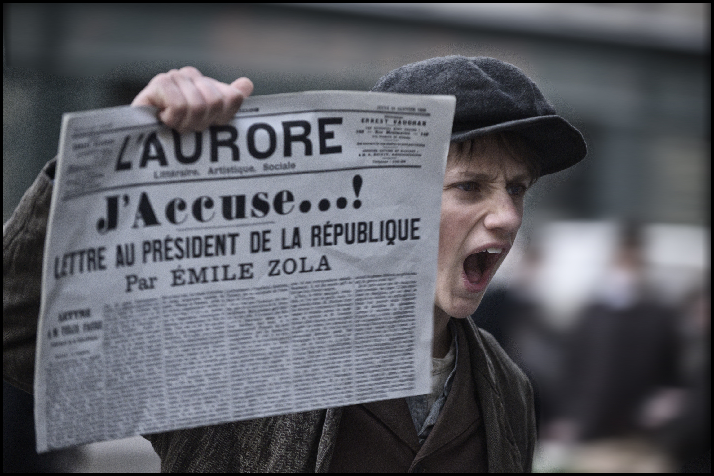Title: J’accuse (An Officer and A Spy)
Director: Roman Polanski
Cast: Jean Dujardin, Louis Garrel, Emmanuelle Seigner, Grégory Gadebois
Hervé Pierre de la Comédie Française, Wladimir Yordanoff, Didier Sandre de la Comédie Française, Melvil Poupaud, Eric Ruf de la Comédie Française, Mathieu Amalric, Laurent Stocker de la Comédie Française, Vincent Perez, Michel Vuillermoz de la Comédie Française, Vincent Grass, Denis Podalydès de la Comédie Française, Damien Bonnard, Laurent Natrella de la Comédie Française, Bruno Raffaelli de la Comédie Française, Luca Barbareschi.
J’accuse (An Officer and A Spy), the film about the Dreyfus Affair, premiered at the 76th Venice Film Festival amid various controversies, since the director is Roman Polanski. Some have newly brought up how in 1977 he was arrested for drugging and raping 13-year-old Samantha Geimer, and that although he pleaded guilty to statutory rape he fled to Europe before completing his sentence. The President of the Venice Jury, Lucrecia Martel, explicitly said that she would have not attended the gala because of the director’s past behavior, clearly expressing a negative bias upon a fair judgement of the film. At the same time she defended Polanski’s right to be in competition. On the contrary the Director of the Mostra Internazionale d’Arte Cinematografica, Alberto Barbera, adamantly expressed that “we have to distinguish necessarily between the artist and the man. The history of art is full of artists who committed crimes of a different nature, nevertheless we have continued to admire their works of art. The same is true for Polanski who is in my opinion one of the last masters still active in European cinema.”
Keeping in mind Barbera’s words, when judging Polanski’s ultimate cinematic enterprise, J’accuse is an outstanding motion picture. The story begins in 1895 when Captain Alfred Dreyfus, a young promising officer, is degraded for spying for Germany and is sentenced to life imprisonment on Devil’s Island. Amongst the witnesses to his humiliation is Georges Picquart, who is promoted to run the military counter-intelligence unit that tracked him down. But when Picquart discovers that secrets are still being handed over to the Germans, he is drawn into a dangerous labyrinth of deceit and corruption that threatens not just his life, but his honor. Dreyfus was eventually proved innocent, but the case was only resolved after twelve years and almost plunged the country into civil war.
The film is very well structured, beautifully shot and brilliantly performed by the entire cast, with Jean Dujardin who has a powerful resemblance to the real Picquart. Most importantly, J’accuse is highly educational, because it introduces this historical event, in a clear and engaging way, to those who are not familiar with the Dreyfus Affair. The political and philosophical challenge that Picquart faces is thus transformed into a police investigation, where the initial accuser traverses a moral dilemma.
Polanski brings to life a universal story, that very much resonates with contemporary situations of wrongful convictions and justice system errors, that have ruined the lives of innocents. This is emblematic in showing how certain institutions — the army in this case — are not willing to show they are fallible, even at the cost of a man’s life and reputation.
Written by: Chiara Spagnoli Gabardi

